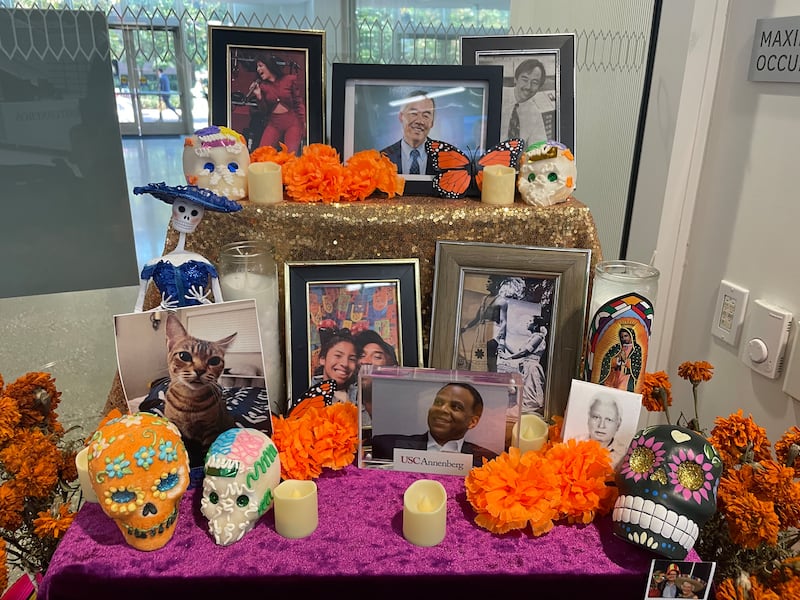Day of the Dead (Día de los Muertos) is typically recognized as a Mexican holiday; however, it is celebrated in other Latin American countries as well. It’s a time when families come together to remember and honor loved ones who have passed away.
The holiday’s origins date back to when the Spaniards wanted to convert their local traditions into Catholicism from the Aztec tradition. The Aztecs praised their goddess Mictecacihuatl, also known as Lady of the Dead, who ruled the underworld and guarded the bones of the dead. They believed the souls of the dead could be returned to visit the land of the living. After the Spaniard’s arrival, the two traditions were merged into what’s celebrated as All Saint’s Day and All Souls Day on November 1st and 2nd, described by The University of Kansas.
Day of the Dead is typically celebrated on the first days of November, but in many different Latin American countries, Day of the Dead starts days prior to November 1. This is because the holiday celebrates different types of remembrance. For instance, on October 28 the deceased who were in an accident are remembered, on October 29 deceased who drowned are remembered, and on October 30 the deceased who were forgotten are honored, according to Mano a Mano: Mexican Culture Without Borders.
Day of the Dead involves many different cultural traditions in the setup. In order to celebrate loved ones, an ofrenda (altar) with the deceased’s favorite foods and drinks, pan de muerto (bread of the dead), and cempasúchil (marigolds) are key.

Many of these items represent different significant cultural histories. The most prominent item is the cempasúchil, which are marigold flowers that represent a guide for the deceased on their spiritual journey to the ofrendas, according to OLLU.
To personalize them, people add other things such as copal the incienso (incense). It’s used to cleanse off the evil spirits so that no danger is returned back home to the deceased. Another element is agua (water) since it’s the source of life that helps the deceased be able to satisfy their thirst after a long day of a journey and to strengthen their return.
Students at USC shared valuable stories with Dímelo about how they celebrate Day of the Dead, which highlights the unique cultural history Day of the Dead has within the Latiné community.
Annabel Dominguez, a junior political science major, said that celebrating Day of the Dead is a significant moment to honor a special person you respected a lot.
“It’s a way to connect with your loved ones, especially if you’ve never met like an aunt or an uncle before,” Dominguez said. “I feel like with Day of the Dead, you can connect with somebody you’ve never met.”
Frankie Alvarez Lora, a junior theater major, said that although he doesn’t celebrate the Day of the Dead, he still recognizes the long history that it brings to the Latine community, and describes it as an important moment to appreciate your heritage.
“We all do [speak] the same language [in Spanish], but all of our inherent cultures are so different, so unique,” Lora said. “That we can kind of still talk about all these different celebrations and still have so many things to talk about after that.”
Yaretzi Hurtado, a freshman biotechnology major, said that although growing up she didn’t celebrate the Day of the Dead as much, she recently started to become more involved in celebrating the special cultural tradition.
“My grandpa. I was very close to him, and he died, like, maybe two years ago,” Hurtado said. “So it’s nice as a day just dedicated to remembering him.”
Other students share how remembering a loved one is valuable because of the memories they have with them.
Dominguez said that honoring the dead brings a lot of meaning in how, when they were alive, they brought them joy in their lives, and how their presence changed them.
“Having this sort of spiritual relationship makes me feel closer, and whenever people talk about them, I feel like if they were still alive. I’d still be close with them, but it just brings their memory to life,” Dominguez said.
Lora said that L.A. is filled with rich Latine history, with many people gathering together to honor the dead and dedicate the space of the ofrenda to show others what Day of the Dead is all about.
“Just getting out there and immersing yourself, there’s a lot of great festival[s] that goes on,” Laro said. “We come from a culture that’s very accepting of strangers and random people. It’s great food, great celebrations.”
Day of the Dead is not a Mexican Halloween; it is dedicated to remembering and honoring the deceased of families and friends, according to The Washington Post.
To visit different events near the USC area, the Los Muertos 5K at Olvera Street is taking place on November 2. To find more, visit Discover Los Angeles to see what ongoing celebrations may be taking place near you.
